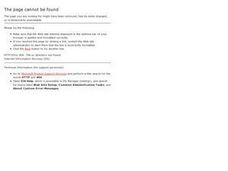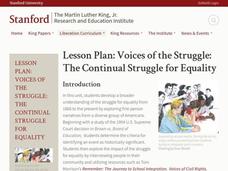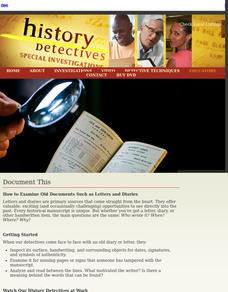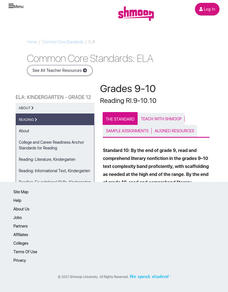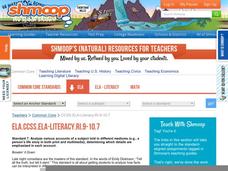Defining US
Integration of Education and American Society
How did the struggle for Civil Rights during the 1950s transform American society and politics? Why are American schools integrated today? Class members explore these essential questions by examining a series of primary and secondary...
Middle Tennessee State University
John Brown: Hero or Villain?
"Love it or leave it." "You're either for us or against us." Rhetoric and it's polarizing effects are the focus of a instructional activity that uses John Brown's attack on Harper's Ferry as an exemplar. Groups examine primary source...
Weebly
Holocaust Diary Project
Here is a good interdisciplinary project that combines creative and narrative writing with studies of the Holocaust. Your young historians will compose a diary of experiences from the perspective of an individual living during the time...
Stanford University
Lesson Plan: Montgomery Bus Boycott
Most of us have heard of Rosa Parks, the Montgomery Bus Boycott, and Martin Luther King, Jr. But what about Claudette Colvin, Virginia Durr, Freedom Summer, or the Birmingham Children's Crusade? A five-lesson unit prompts class members...
Jamestown-Yorktown Foundation
Making a Patriot Inquiry: Are Independence, Freedom, and Liberty the Same Thing?
As part of a study of the American Revolution, class members engage in an inquiry-based lesson that has them watch a scene from the play Slave Spy, examine multiple primary source documents, and then discuss the similarities and...
Curated OER
For the Record
Young scholars read a New York Times article in order to examine the importance of cultural artifacts. They create essays from the point of view of one cultural artifact to demonstrate the knowledge they gained by doing research.
Curated OER
William Apess and the Mashpee "Revolt" of 1833
Prompt your class with the following question: What was the status of American Indians in Massachusetts during Jackson's presidency? To answer this question, class members will read a series of primary source documents (attached),...
Teaching History
Jamestown: The Starving Time
Students analyze a variety of primary and secondary sources to determine the cause of the Jamestown starving time during the winter of 1609–1610.
Stanford University
Voices of the Struggle: The Continual Struggle for Equality
As part of a study of the Civil Rights Movement from 1868 to the present, class members examine first person narratives, the Supreme Court case Brown v. Board of Education, and other significant events in civil rights history. They then...
Stanford University
Beyond Vietnam
On April 4, 1967 Martin Luther King, Jr. delivered his speech "Beyond Vietnam." The controversy that followed is the focus of a three-lesson plan unit that asks class members to consider the political and social implications of King's...
PBS
March on Washington: A Time for Change
Young historians conclude their study of the events that lead up to and the planning for the March on Washington. After examining videos and primary source documents, they consider the civil rights objectives that still need to be...
PBS
Think Like a Historian: A Viewing Guide
Calling all junior detectives! Scholars use the tools of investigation to determine the causes and impacts of the American Civil War. Using viewing guides, videos, group research, and written resources, they discover what it takes to...
PBS
Family History: On Your Honor
What is your history? Scholars work with their own families to create a unique story of the courage and bravery of their ancestors. The third and final part of the series culminates in a creation of not just a family history, but a...
PBS
Women's History: Glass Windows; Glass Ceilings
Discover stories about women's history in beautiful stained glass windows. The second in a three-part series teaches scholars about a famous artistic style of stained glass windows and the influential women that used art to impact...
PBS
Civil War: Blacks on the Battlefield
Imagine a war being fought to free slaves, with slaves on the front line. Scholars use primary documents, videos, and research in the second installment of a three-part series to guide their analysis of the first African-Americans on the...
PBS
Who Knows Best
Finding an expert in a given field when conducting research can be a challenge. This guide provides step-by-step directions as well as links to resources that help young sleuths find the authorities and experts they need. As a bonus, two...
PBS
Document This
Being a historian requires serious sleuthing. They examine primary source documents and look for evidence, for clues that reveal who wrote the document, when, and why. After watching two historians model the process, young history...
Learning to Live
Attributes of a Civil Society
What makes a society civil? High school freshmen search for examples of justice, kindness, peace, and tolerance in news media and brainstorm how they can promote these attributes in their schools, communities, and world. The well-rounded...
For the Teachers
Cause and Effect Matrix
Study cause and effect in both literature and informational text with a lesson designed for several different reading levels. After kids review the concept of cause and effect, they read an article or story and note the causes and...
National Endowment for the Humanities
Revolution '67, Lesson 2: What Happened in July 1967? How Do We Know?
Even in a world in which dozens of participants and curious onlookers record every controversial event, the basic facts of what happened are often in dispute. Revolution '67, Lesson 2 explores 1967 Newark, New Jersey using an examination...
Shmoop
ELA.CCSS.ELA-Literacy.RI.9-10.10
Make sure that your pupils have mastered complex literary nonfiction by the end of the year and use this resource to help get them to that point. After a brief description of the Common Core standard, a list of age-appropriate...
Shmoop
ELA.CCSS.ELA-Literacy.RI.9-10.7
When your pupils read an account of an event, are they conscious of the fact that this particular account might focus on certain details, while ignoring others? Open their eyes to bias and varying interpretation of facts with the ideas...
Curated OER
Chasing Lincoln's Killer: A Novel Study
James Swanson's novel, Chasing Lincoln's Killer, provides an engaging unit of study for all readers.
Speak Truth to Power
Jamie Nabozny: Bullying: Language, Literature and Life
Class members identify bullying in contemporary texts and role play how they might change those scenes to examples of anti-bullying. They then re-define their initial definitions of bullying and discuss what they would like to see as...
Other popular searches
- Historical Fiction
- Historical Maps
- Historical Figures
- Teaching Historical Fiction
- Famous Historical People
- Historical Periods
- Historical Events
- Historical Songs
- Historical Person
- Historical Research
- Historical Fiction Time Line
- Historical Documents








